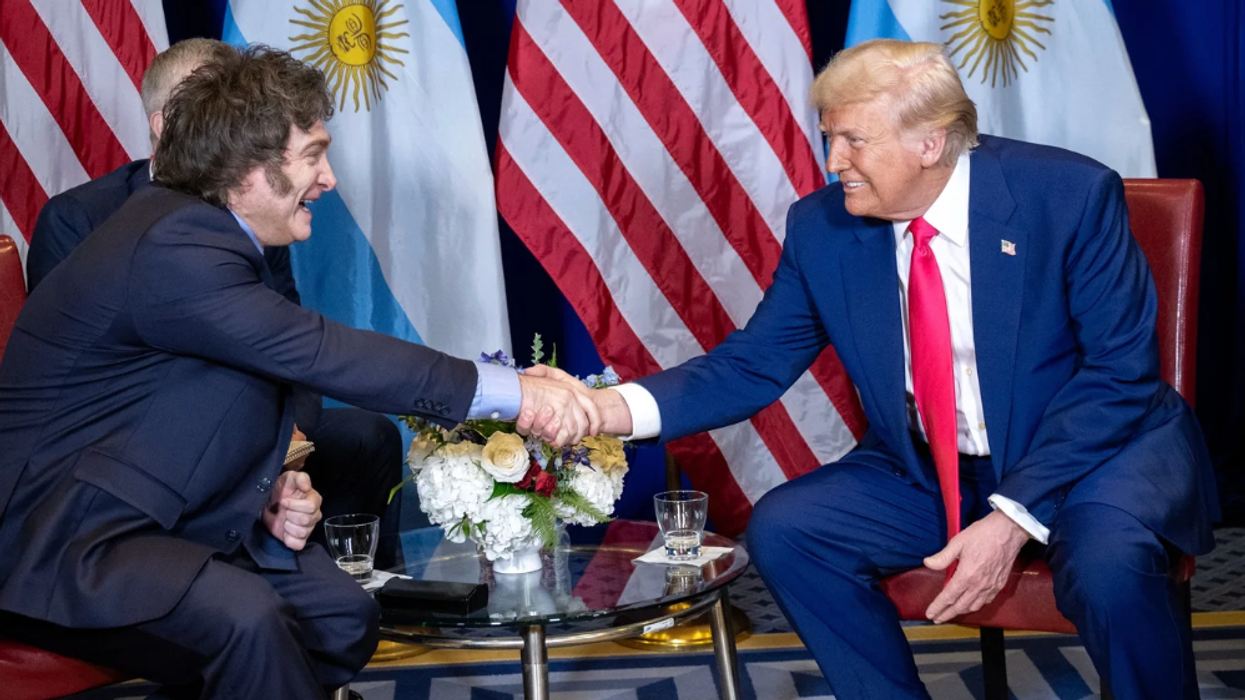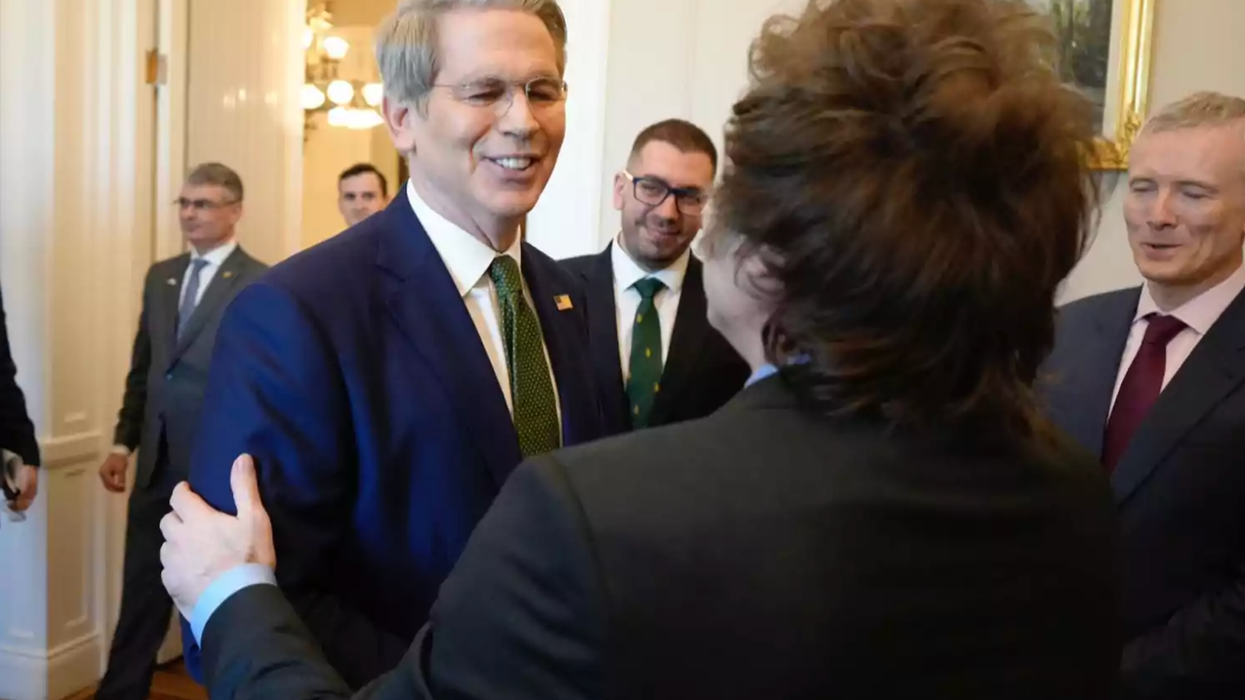Waking Up? Argentina Bailout Bares Trump's Contempt For Rural America
Is rural America starting to fall out of love with Donald Trump?
Policy wonks like me have spent decades pointing out that if rural Americans voted based on their informed self-interest, they would be supporting Democrats, not Republicans. Republicans are constantly trying to eviscerate Democrat-supported programs that benefited rural states like Medicaid spending, SNAP (the supplementary nutrition program formerly known as food stamps), and school lunches. Trump is also cutting subsidies for green energy programs like solar farms and wind turbines – subsidies that disproportionately went to red states. Iowa gets 63 percent of its electricity from wind!
Moreover, these programs in effect subsidize rural areas with dollars earned in urban areas: because rural areas have lower incomes than urban areas, rural Americans pay relatively little of the taxes that finance these programs. So Democratic “big government” is highly beneficial to the heartland.
Yet economic self-interest has been swamped by “rural consciousness.” This consciousness rests on a belief that highly educated urban elites don’t understand or value rural culture and rural lives. And I will admit that this belief contains a grain of truth. Urban elites are unlikely to fully understand the attachment of rural Americans to a particular place and its time-worn rhythms of life. Ensconced in salaried jobs, urban dwellers are unfamiliar with the constant anxiety of being a farmer or a small business owner in the heartland.
Decades of being battered by the economic changes -- deindustrialization, farm consolidation and corporatization, depopulation, loss of community ties, along with the loss of jobs, particularly “male-coded” jobs – have left rural Americans feeling adrift, marginalized and resentful.
And this created an opening to be exploited by the right wing. Much like how Trump peddled fantasies of a manufacturing resurgence or the return of coal-mining jobs, MAGA leveraged the deep discontent within rural America to inculcate the belief that only Republicans, and Trump in particular, respect rural voters. But this is false: MAGA actually holds its most loyal voters in contempt.
And the reality of this contempt is starting to show through — not, at least so far, via the One Big Beautiful Bill’s savage cuts to health care, which will be especially devastating to rural areas, but via the Trump administration’s bizarre fixation on aiding President Javier Milei of Argentina.
The truth is that rural America is even more dependent than urban America on the programs now on the chopping block. The nonpartisan Economic Innovation Group has mapped out where in America people depend for a large share of their income on government transfers: the counties where a lot of income comes from government programs, indicated in yellow, are overwhelmingly in rural areas, while the places where such aid plays a relatively small role (light blue) mainly correspond to major metropolitan areas:

Why has rural America become increasingly dependent on government aid? The main answer is declining economic opportunity, which has led to an exodus of young people, leaving behind an older population that relies on Social Security and Medicare. Even younger rural residents have low incomes that make them eligible for mean-tested programs, above all Medicaid and food stamps.
There shouldn’t be any shame about the fact that rural America is subsidized by more affluent parts of the nation. That is, after all, what a national social safety net is supposed to do. But it should make rural voters oppose politicians who support Project 2025-type plans to rip up that safety net, which will deeply impoverish already poor regions and degrade life even for those not personally receiving aid — for example, by leading to the closure of many rural hospitals, making health care inaccessible even to those who still have health insurance.
Yet rural voters went overwhelmingly for Trump last year. Why?
Many clearly felt that educated urban elites don’t understand their lives and values — which is true. Most people in New York or Los Angeles don’t have a good sense of what life is like in rural America. But the reverse is also true: Many, perhaps most rural Americans imagine that the surprisingly safe and livable city where I’m writing this is a crime-ridden hellscape, that Chicago and Portland are “war zones,” and so on.
Rural voters may also have imagined that they would be protected from the harsh treatment being meted out to blue cities. After all, our political system gives rural voters disproportionate influence. Wyoming and the two Dakotas combined have roughly the same population as Brooklyn, yet they have six senators while Brooklyn has to share two senators with 16 million other New Yorkers.
For both reasons, rural voters either tuned out or refused to believe warnings that a Trump victory in 2024 would be catastrophic for the heartland, that crucial programs would be eviscerated and the agricultural economy would be devastated by Trump’s trade wars.
I thought that rural voters might finally start to realize that they have been taken for a ride when the cuts began kicking in. This will begin to happen next month, when the 22 million Americans, many of them in rural areas, who receive subsidies to help buy health insurance under the Affordable Care Act will see their premiums soar, on average by more than 100 percent. It will happen even more dramatically late next year (after the midterms), when the big cuts to Medicaid and food stamps kick in.
An aside: When I went to the relevant government page to look up food stamp data, I was confronted by this banner:
This is not how government for the people is supposed to work, and we shouldn’t lose our sense of outrage.
But back to a possible rural awakening: It may be starting ahead of schedule, thanks to, of all things, the Trump administration’s efforts to bail out Argentina’s Javier Milei.
The attempt by Trump and Scott Bessent, the Treasury secretary, to rush $20 billion to Argentina isn’t a big deal compared with the planned savage cuts to crucial programs. But it’s a graphic demonstration of the administration’s hypocrisy. After all the America First rhetoric, all the insistence that spending must be slashed, suddenly we’re sending lots of money to a foreign nation in which we have no real interest except for the fact that its president is a MAGA favorite. I don’t know how many voters are aware that these moves are in large part an attempt to bail out Bessent’s hedge-fund buddies, but I think the sense of something wrong and corrupt is leaking through.
Furthermore, from farmers’ point of view, Argentina is a rival — a big soybean exporter at a time when Trump’s trade war has locked our own farmers out of China’s market.
And as emphasized in a recent conversation between Greg Sargent and a rural Democratic activist, farmers have been shocked and outraged by Trump’s casual suggestion that he might start buying Argentine beef to sell in the U.S. market. That conveys the impression that Trump doesn’t care at all about his most loyal followers — an impression that is completely correct.
We shouldn’t expect rural America to suddenly do a 180 and abandon Trump. Sargent sends us to a lament from one rancher who calls the idea of buying Argentine beef an “absolute betrayal” — but begins by saying to Trump, “We love you and support you.” The sheer extent to which rural Americans have been hoodwinked will make it hard for them to admit their error.
But there are at least hints of a rural awakening. And for the sake of the nation urban and rural Americans share, it can’t come fast enough.
Paul Krugman is a Nobel Prize-winning economist and former professor at MIT and Princeton who now teaches at the City University of New York's Graduate Center. From 2000 to 2024, he wrote a column for The New York Times. Please consider subscribing to his Substack.
Reprinted with permission from Paul Krugman.












